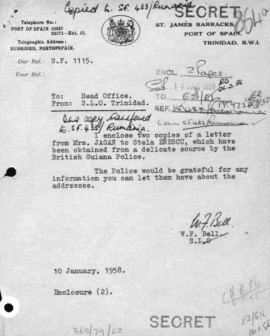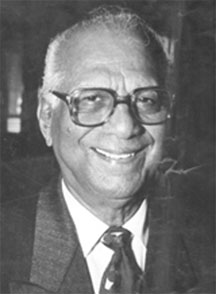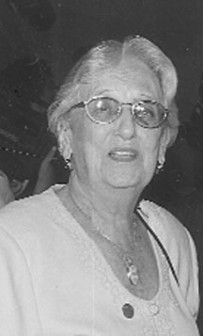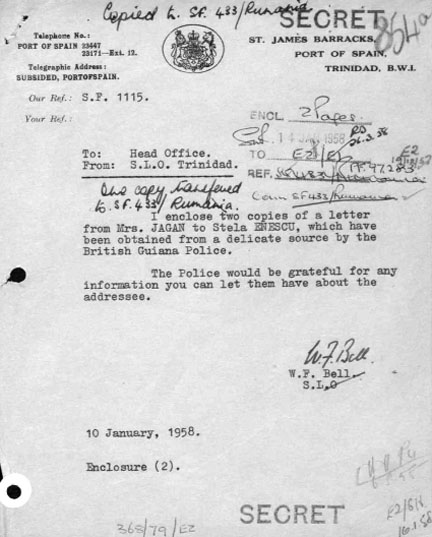Tapped phones, a warship in the night and dramatic details of the upending of the Cheddi Jagan government here in 1953 are revealed in secret documents declassified on Friday by Britain’s MI5 security service.
Cables, letters, reports, records of surveillance and telephone conversations were among the dozens of documents released by the UK’s National Archives that reveal in detail how the UK under Prime Minister Winston Churchill constitutionally threw out Cheddi Jagan’s government here in 1953. The documents revealed how British spies kept up intense scrutiny on Cheddi and Janet Jagan, who founded the People’s Progressive Party to campaign for independence from British rule. Other members of the party including LFS Burnham also came under scrutiny in what were tense times for the British.
Churchill’s government and the USA had feared that the fervently-communist Jagan and his American wife Janet would lead then British Guiana into the Soviet bloc. Christopher Andrew, the spy agency’s official historian, told the Associated Press that the files provide new details of the suspension of the Constitution, and “further evidence that MI5 played a more important part in British decolonization than is often realized”.

“Both are able and intelligent and the mere fact that Janet Jagan is white, young and not unattractive in appearance lends considerable interest to her activities and those of her husband,” he said.
To British authorities, the Jagans were a headache. To the Americans, they were a potential Communist threat on America’s doorstep. MI5 concluded that the party was “not receiving any financial support from any Communist organization outside the country.”
Nonetheless, amid worsening strikes and unrest, Britain grew unhappy with the Jagans’ “disruptive antics”, AP reported.

After the party won a big majority in British Guiana’s 1953 election, making Cheddi Jagan prime minister, Churchill decided to act. “We ought surely to get American support in doing all that we can to break the Communist teeth in British Guiana,” Churchill wrote to his colonial secretary.
In the end, Britain acted alone; mounting a military operation code-named Operation Windsor. Churchill dispatched a warship, HMS Superb, and brought hundreds of troops by air and sea to secure key sites. On Oct. 9, Britain suspended British Guiana’s constitution, fired its legislators and arrested the Jagans. The surprise military operation went according to plan.

In his then ‘top secret’ report and seen by Stabroek News, the Trinidad-based MI5 officer detailed his arrival in Georgetown on October 6, 1953. “On arrival in Georgetown, I found the Governor and the other authorities almost in a state of despair,” he said. They had just heard the news that warships were heading to Georgetown with troops on board and that the Colonial Office had denounced the communist regime in British Guiana.
The Governor was exceedingly angry because he had no prior knowledge that a broadcast of the news would be made. “In actual fact this broadcast jeopardized the safety of the colony and the lives of many loyal Europeans and natives for nearly 36 hours,” the spy wrote. “After the broadcast, the PPP had gone into a long conference which lasted nearly all night. There was also intense activity at the Party Headquarters and the private houses of the ministers. Suitcases were placed in cars which were driven out of Georgetown and it was obvious that records and documents were being taken away for destruction or concealment,” the spy wrote.
Colonial authorities gathered officials and their families and urged the troopships to hurry. On October 8, they arrived. “At this stage I must pay a tribute to all the persons who were in the secret in Georgetown. As far as we know there was no leak of information and it was obvious that the PPP leaders had no idea that the Constitution would be suspended or that they might be arrested,” the agent wrote.
He outlined the discussions at the Government House by the Governor and other colonial authorities as to what should be done after the announcement of the suspension of the Constitution.
Sandwiches
The BWIA airlift with more troops came in exactly as arranged and complete secrecy had been preserved throughout, the agent said. He hailed his wife and other women for making sandwiches for troops who stopped in Trinidad. “I might add in parenthesis that catering arrangements for the airborne troops during their halt in Trinidad were carried out by Mrs. Beadon, wife of the Commissioner of Police, Mrs. Rahr, my wife and Joyce Huggins … and I understand that no less than 600 large sandwiches were cut by these ladies,” he wrote adding that it would have been dangerous to bring in any outside catering firm.
On October 9, the Governor broadcast his announcement of the suspension of the Constitution. The private desks of the Ministers were searched. “We drew an absolute blank with Sydney King. (Forbes) Burnham’s desk contained no documents of what I might call international interest but there was some material of local value to (David) Rose and also books and pamphlets on racial questions which will be examined further,” the spy wrote. Dr Jagan’s desk yielded material of some interest.
The agent also reported the arrival and subsequent expulsion of Arthur Clegg of the Daily Worker. “He will doubtless create a fuss,” the spy wrote.
As the situation evolved, raids were planned. “I had several long discussions with (Special Branch and CID Head David Rose) and we decided to attempt to obtain information as to where the records and documents of the PPP and its leaders have been hidden,” he wrote.
The subsequent events are captured in the declassified files including tapped telephone conversations.
For the next three years, British Guiana was ruled under emergency powers by the British governor and appointed officials, and the Jagans were kept under house arrest and intensive surveillance.
By the 1960s, Britain’s spies worried the Jagans would turn to newly Communist Cuba, possibly making Guyana a base for Latin American revolutionaries. The Jagans remained a major force in Guyanese politics, and Cheddi Jagan became prime minister again in 1961, when the batch of MI5 files ends. After the Cold War ended, Cheddi Jagan served as president of Guyana from 1992 until his death in 1997. His wife succeeded him between 1997 and 1999.
In the declassified files, some intercepted letters are reproduced while memos revealed that some persons who were in contact with the Jagans were also under surveillance. In one document in 1958, it was noted that Derek Jagan and Miles Fitzpatrick arrived in British Guiana and “without doubt retain their communist contacts.” It is necessary, said a memo from the Trinidad-based agent, “we could restrict our list of “essentials” to Dr. and Mrs. Jagan, Derek Jagan and Miles Fitzpatrick, for the time being and provided we could maintain a good cover on outgoing mail addressed to them from the UK, some of the less important persons on our list could be allowed to lapse until we improve our system again here.”
Sometimes, it reads like a movie script. In a footnote at the end of a conversation between Dr Jagan and Rolly Simms discussing, among other things, a boycott of Booker stores, the agent writes “Rolly Simms picked up the phone again and said ‘Heard everything?’ giggled, and replaced the receiver.”






